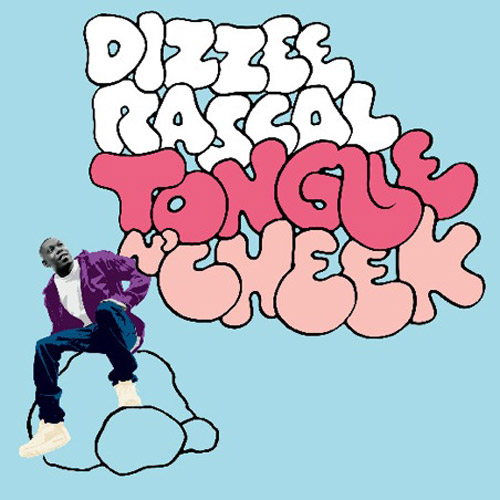Dizzee Rascal shocked fans in 2008 with the release of “Dance Wiv Me,” a straight-up club-rap track with no trace of the dark, aggressive grime that made him famous. Produced by Calvin Harris and set to a loping, even friendly, trifle of a beat, Dizzee’s rapid-fire rap is slowed down to a careful, deliberate rhythm; every word is carefully pronounced, with a sort of lusty, knowing goofiness replacing the venomous and hateful flow of albums past. Dizzee spits lines like “I’m looking for the perfect view/The way I see it, that’s right next to you” with all the gravity and subtlety of a sleaze slinging cheap come-ons in a dive. He’s audibly taking the piss, but at the same time, he sounds deathly serious. Oh yeah, and the song went to number one.
It’s this sort of uncomfortable push-and-pull between credibility and shameless fun that makes a record like this so hard to evaluate. Arguably the UK’s equivalent to The Blueprint 3, Tongue N’ Cheek features a legendary rapper at his most smug and confident saying inane things over absurd beats. It’s hard to tell whether we’re supposed to laugh or cry; is Dizzee in on the joke? He can’t be serious with a song called “Bonkers.” The album’s title betrays a certain self-awareness, but feels oddly coy especially with the mangling of the phrase “tongue in cheek.” A cursory glance at the tracklisting does nothing to assuage uneasy feelings. With production credits by the likes of Armand Van Helden and Tiësto (yes, Tiësto), it’s enough to make a fan wretch in disgust. It’s not all bad news; the tracklist also features credits by Cage, a co-production by the rapper himself, and even a song with former collaborator Shy FX.
But how does the album actually sound? It’s clear from first track “Bonkers” that we’ve come a long way from “I Luv U;” produced by Armand Van Helden and featuring a monotonous verse and chorus repeated ad nauseum over alternating 4/4 techno beats and distorted synth washes, the beat is Eurodance at its cheapest, and the lyrics, are, well, bonkers: “Some people think I’m bonkers/But I just think I’m free/Man I’m just livin’ my life/There’s nothin’ crazy about me.” It makes for a confusing and annoying three minutes. But hey, it hit number one. There’s a pattern here. Disheartening introduction aside, “Road Rage” (prod. Aaron LaCrate and Samir) immediately picks up the pace with a frantic beat and angry lyrics — this is the Dizzee I know. It’s a frenetic and complex beast of a record – it is unstoppable until Dizzee makes some demoralizing “meow” noises all over the chorus. Fortunately, the album sets off on what becomes a winning streak with “Dance Wiv Me” – not exactly grime, but still great. Once the Cage-produced section of the album begins, Dizzee’s flow picks up, and the beats become intricate and impressive rather than feeling like cheap Basshunter knockoffs.
Listening to the strident midsection, it’s hard not to be impressed by Dizzee’s inhuman ability. The lyrics are still inane, so it looks like the arch Dizzee is mostly gone – example hooks are “Yeah I get freaky freaky freaky/And I get nasty nasty nasty” and “Money money money/Girls girls/Cash cash!” – but silly Dizzee is still enjoyable. The Cage-produced tracks balance the frivolity with fantastic production, and his “Chillin’ Wiv Da Man Dem” provides an unexpected album – possibly even career – peak. Dizzee effortlessly floats on a bed of loungy, jazzy beats, with an irresistibly cool flow. It’s rare to hear him this relaxed (if still a little tense), and it’s an undeniable treat. “Dirtee Cash,” “Money, Money” and “Can’t Tek No More” provide solid Dizzee verses with all-around excellent production.
Good things never last, however, and towards the end of the album we’re “treated” to another Calvin Harris production. “Holiday” sounds more like a bad remix of his own “I’m Not Alone” than a grime track, and Dizzee sounds as out of place as you’d expect. His delivery is jilted and uneven, and feels ridiculous pasted on top of the maximalist synths, while the hook has Calvin Harris attempting to appropriate the breezy robotic affectations of “California Love,” only a decade too late. And, of course, it’s the third number one hit. Tiësto gets to close the album with “Bad Behaviour”, and shows admirable restraint in doing so; his synth farts sound more restrained than “Bonkers,” and Dizzee doesn’t spew garbage all over the track. It’s an acceptable, if not ideal ending to the album.
For an unabashed sell-out move into the pop realm (three number one singles and counting!), Dizzee’s latest effort still feels remarkably cohesive; in fact, it works even better front-to-back than previous records. Where Showtime and Maths + English felt overlong or bogged down with filler, this album is a quick and dirty ride. Starting audaciously, ending triumphantly, and flying high in between, Tongue N’ Cheek is an uneven album that’s always interesting, even when it falls flat on its face. Dizzee may be criticized for abandoning his grime roots, but doubtless another phoned-in album would have been an even worse move. It’s pop, but still essentially new – Wiley’s comparable “Wearing My Rolex” felt more like an exception than a brave new direction – and let’s not forget this is a transition, so we can forgive the unevenness.

